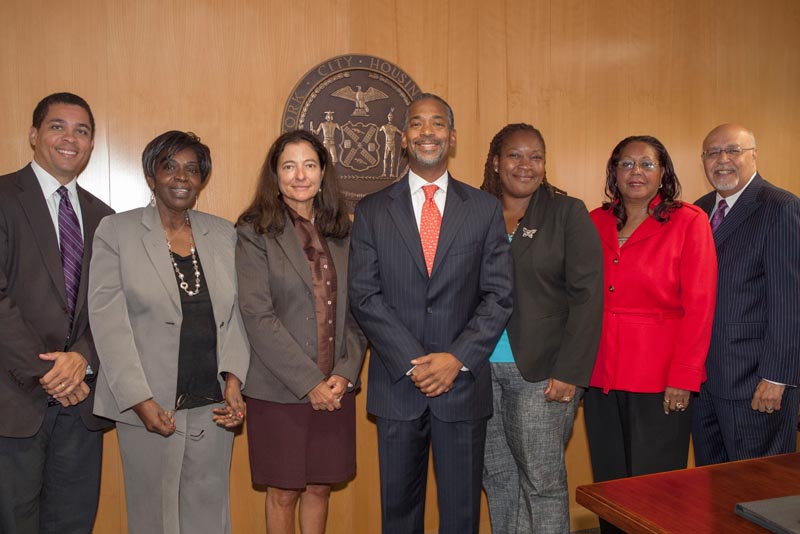
The New York City Housing Authority got more than just a new board of directors last month. The agency got a whole new management structure.
Not that the new board will necessarily be around long with a new mayor taking office in January. But it's a big change that's generated more controversy and criticism than any other.
The changes took state legislation. That happened earlier this year when Gov. Andrew Cuomo signed into law a bill that changed the number of NYCHA board members, who can serve, their compensation and, to a tremendous degree, who has influence with the board.
The structural changes to the board are substantial. But how will it affect those living in public housing and all of us in New York City?
NYCHA used to have a five-member board with most members (but not the one tenant representative) getting full-time compensation. Two of the board members received annual salaries of $187,000 and an assigned NYCHA driver. Chairman John Rhea's compensation was over $200,000.
{sidebar id=14}
Only one of the five members was required to be a public housing tenant. That director was paid only $150 a meeting.
The new board retains Rhea as Chair and CEO of NYCHA with a compensation of $197,300. But the other six board members will be volunteers paid only a stipend not to exceed $1,500 a month based on $250 for each four hours of time required. If the stipend exceeds $200 a month, the additional amount will be reported as income. And no assigned drivers.
The changes were obviously intended to cool steaming public outrage over excessive compensation — not to mention operating problems — and increase tenant representation on the board. But the real impact is likely to be increased mayoral control of NYCHA.
In the old set up, NYCHA board members, appointed for five-year terms, could only be removed "for cause" and after a due process hearing. That meant only one board seat came up for appointment each year. A mayor could be three years into his term before he appointed a majority of the NYCHA board.
Now the term will be will be three years, except for the chair, who serves entirely at the mayor's discretion. The mayor will have the authority to fire any member if he or she finds cause to do so. There's no more requirement for a hearing. That puts the mayor in complete control and makes the mayor completely accountable for NYCHA's performance going forward.
There were certainly disagreements in the recent mayoral primary campaigns about lots of issues, but everybody criticized NYCHA.
NYCHA has long run operating deficits of tens of millions of dollars. The 2014 projected deficit is $87 million. They have a repair backlog that often runs a year and more. They were universally criticized for a poor response to Hurricane Sandy that left some disabled tenants stranded in buildings without heat or working elevators for weeks. Some for months.
In recent months, the NYCHA board has proposed highly unpopular layoffs and service cutbacks. They've also proposed an even more controversial plan to build luxury housing on the grounds of some housing projects while the public housing waiting list stretches out for years and years.
Meanwhile, the city’s public housing has a massive need for infrastructure improvements and building system repairs. NYCHA is constantly attacked for mismanagement, inefficiencies and a lack of advance planning. Even HUD Secretary Shaun Donovan, the federal cheerleader for public housing, criticized NYCHA publicly for their huge repair backlog while failing to spend $1 billion of HUD funds given to them for that purpose. Donovan questioned NYCHA's competence at a senate public hearing.
Democratic mayoral candidate Bill de Blasio's website says that "New York City needs a mayor who takes ownership of our public housing crisis." He's called for a full overhaul of NYCHA management and specifically getting rid of NYCHA Chair John Rhea.
Republican mayoral nominee Joe Lhota criticizes NYCHA as a big, unwieldy bureaucracy. He, too, has called for changing NYCHA's "entire management.”
In fairness, NYCHA has been on the receiving end of continuing cuts in federal appropriations. NYCHA reports they lost $205 million in federal funding in the current fiscal year from cuts including sequestration. The chances for increased federal funding are bleak. More cuts are likely.
NYCHA manages 334 housing developments with over 400,000 tenants. They give Section 8 housing vouchers to families made up of another 235,000 people. That's 635,000 New Yorkers depending on them.
While naming the new board, Mayor Michael Bloomberg defended the agency for facing up to challenges "even as some cities have walked away from their commitment to public housing."
It might be an example of being careful what you wish for. While the next mayor owns NYCHA, it’s broken — with no apparent sufficient funding in its future. The mayor will have control but there's one thing he won't have anymore: a convenient target if things don't get better.
Jeff Foreman is Policy Director at Care for the Homeless. Follow him on Twitter at JeffForeman2